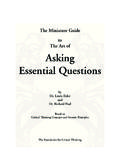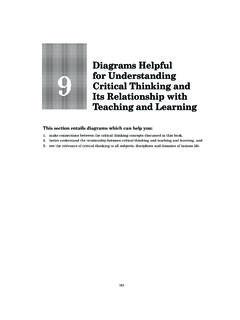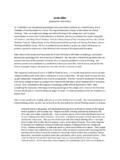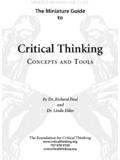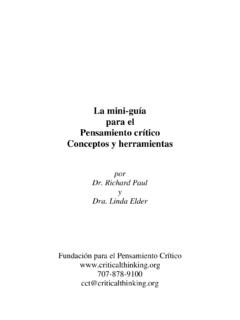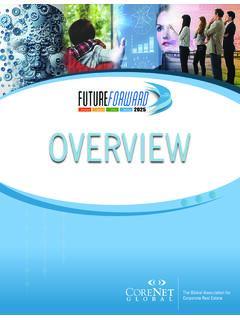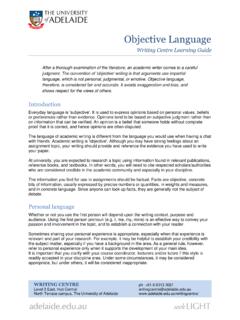Transcription of Aspiring Thinker's Guide to Critical Thinking
1 Limited preview version The Aspiring Thinker's Guide to Critical Thinking By Dr. Linda Elder and Dr. Richard Paul The Foundation for Critical Thinking limited preview version Introduction for Teachers and Students Humans live in a world of thoughts. We accept some thoughts as true. We reject others as false. But the thoughts we perceive as true are sometimes false, unsound, or misleading. And the thoughts we perceive as false and trivial are sometimes true and significant. The mind doesn't naturally grasp the truth. We don't naturally see things as they are. We don't automatically sense what is reasonable and what unreasonable. Our thought is often biased by our agendas, interests, and values. We typically see things as we want to. We twist reality to fit our preconceived ideas. Distorting reality is common in human life. It is a phenomenon to which we all, at times, unfortunately fall prey.
2 Each of us views the world through multiple lenses, often shifting them to fit our changing feelings. In addition, much of our perspective is unconscious and uncritical and has been influenced by many forces including social, political, economic, biological, and psychological influences. Selfishness and narrow-mindedness are deeply influential in the lives of most people. We need a systematic way to further sound Thinking and limit unsound Thinking . We need to take command of our minds in order to determine in a reasonable way what Thinking to accept and what to reject. Critical Thinking is that process, that orientation, and in the finest cases, that way of living. This Guide focuses on the essence of Critical Thinking concepts. For teachers it provides a shared concept of Critical Thinking . For students it introduces Critical Thinking and provides strategies for developing one's own Critical Thinking .
3 Teachers can use it to design instruction, assignments, and tests in any subject. Students can use it to improve their learning in any content area. The skills implicit in this Guide apply to all subjects. For example, Critical thinkers are clear as to the purpose at hand and the question at issue. They question information, conclusions, and points of view. They strive to be clear, accurate, precise, and relevant. They seek to think beneath the surface, to be logical, and fair. They apply these skills to their reading and writing as well as to their speaking and listening. They apply them in all subjects and throughout life. If you are a student using this Guide , get in the habit of carrying it with you to every class. Consult it frequently in analyzing and synthesizing what you are learning. Aim to deeply learn the ideas you find in it - until using them becomes second nature.
4 Limited preview version The Aspiring Thinker's Guide to Critical Thinking 1. Contents There are Three Main Kinds of Thinkers .. 3. The Fairminded Critical Thinker ..4. The Selfish Critical Thinker ..5. The Na ve Thinker ..6. Developing Intellectual Character .. 7. How to Become a Fairminded Critical Thinker ..8. Intellectual Standards Help You Think Better .. 10. Be Clear: Don't Confuse People .. 11. Be Accurate: Make Sure it's True .. 12. Be Relevant: Make Sure You Stay on Track .. 13. Be Logical: Make Sure Everything Fits Together .. 14. Be Fair: Make Sure You Consider Others .. 15. Some Important Intellectual Standards .. 16. A Checklist of Questions You Can Ask to Target Intellectual Standards .. 17. Thinking About Fairness .. 18. Journal Entry Focusing on Unfair Thinking and Behavior .. 19. We Take Our Thinking Apart to Find Problems in Our Thinking and Solve Them .. 20.
5 Think About Purpose .. 21. State the Question .. 22. Gather the Information .. 23. Check Your Inferences .. 24. Question Your Assumptions .. 25. Clarify Your Concepts .. 26. Understand Your Point of View .. 27. Think Through the Implications .. 28. Clarifying Inferences and Assumptions .. 29. Finding Your Inferences and Assumptions .. 31. First Edition 2009 Foundation for Critical Thinking Press limited preview version 2 The Aspiring Thinker's Guide to Critical Thinking Critical Thinkers Seek Better Ways of Doing Things .. 33. Strategies for Using the Parts of Thinking : Analyzing Problems .. 34. Analyzing Characters in a Story .. 36. Analyzing Chapters in a Textbook .. 38. Analyzing Experiments .. 40. Analyzing the Data Collected (After Experiments) .. 41. Analyzing Subjects or Disciplines .. 42. Asking Questions Which Target the Parts of Thinking .. 43. Strategies for Clarifying and Understanding Important Ideas: Clarifying Your Own Ideas, Clarifying What Others Say.
6 44. Thinking Through Conflicting Ideas .. 45. Thinking Through Important Ideas .. 46. Reflecting Upon Important Ideas Learned .. 47. The Thinker's Guide Library .. 48. 2009 Foundation for Critical Thinking Press limited preview version The Aspiring Thinker's Guide to Critical Thinking 3. There are Three Main Kinds of Thinkers The The The Selfish Fairminded Na ve Critical Critical Thinker Thinker Thinker The person The person The person who doesn't who is who is not care about, good at only good or isn't Thinking , at Thinking , aware of, but unfair but also his or her to others fair to others Thinking Each of us may sometimes be a na ve thinker, sometimes a selfish Critical thinker, and sometimes a fairminded Critical thinker. We can create a better world when we work together to be fair to everyone. We will never be perfect, but we can always improve our Thinking . This Guide will help you develop as a fairminded thinker.
7 2009 Foundation for Critical Thinking Press limited preview version 4 The Aspiring Thinker's Guide to Critical Thinking The Fairminded Critical Thinker Fairminded Critical thinkers work to improve their Thinking whenever they can. They want things for themselves, but they aren't selfish. They want to help other people. They want to help make the world better for everyone. They are willing to give things up to help others (when it makes sense to). They don't always have the right answers, but they work to improve their Thinking (and actions) over time. here is the voice of the fairminded Critical thinker . I think a lot. It helps me learn. It helps me figure things out. I want to understand the Thinking of other people. In fact, I even want to understand myself and why I do things. Sometimes I do things I don't understand. It's not easy trying to understand everyone and everything.
8 Lots of people say one thing and do another. You can't always believe what people say. You can't believe a lot of what you see on TV and the internet. People often say things they don't mean because they want things and are trying to please you. I would like to make the world a better place. I want to make it better for everyone, not just for me and my friends. To understand other people you have to look at things as they do. You have to understand their situation and what you would feel like if you were them. You have to put yourself in their shoes. I think about people who don't have what I have, like people who are starving or homeless. I want to help create a world where everyone has enough to eat and somewhere to live. It isn't easy to be fair. It's a lot easier to be selfish and just think about yourself. But the world isn't a nice place to be if people are selfish.. 2009 Foundation for Critical Thinking Press limited preview version The Aspiring Thinker's Guide to Critical Thinking 5.
9 The Selfish Critical Thinker Selfish Critical thinkers are people who use their Thinking to get what they want, without considering how their actions might affect other people. They are good at Thinking , and they know it. But they are also very selfish. They may be greedy and unkind as well. here is the voice of the selfish Critical thinker . I think a lot! It helps me get what I want. I believe whatever I want to believe as long as it gets me what I want. I question anyone who asks me to do what I don't want to do. I. figure out how to get other people to do what I want them to do. I even figure out how to avoid Thinking if I want. Sometimes I say I can't!' when I know I could but don't want to. You can get what you want from people if you know how to manipulate them. Just the other night, I talked my parents into buying me a really expensive new computer gadget I knew they couldn't really afford.
10 But hey, they work don't they? They can always make more money. I'm their kid so they should give me what I want. It helps to tell people what they want to hear. Of course, sometimes what they want to hear isn't true, but that doesn't matter because you only get into trouble when you tell people what they don't want to hear. You can always trick people if you know how. Guess what, you can even trick yourself if you know how.. 2009 Foundation for Critical Thinking Press limited preview version 10 The Aspiring Thinker's Guide to Critical Thinking Intellectual Standards Help You Think Better The best thinkers don't believe any and everything they hear or read. They use intellectual standards to decide what to believe. They use intellectual standards to keep their Thinking on track. In this Guide , we focus on some of the important ones. When you use them every day, your Thinking improves.
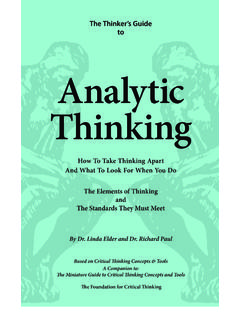
![riChard Paul [ ] - Critical thinking](/cache/preview/4/4/e/4/c/a/a/a/thumb-44e4caaa8aace41cbe216a7e608396cc.jpg)


